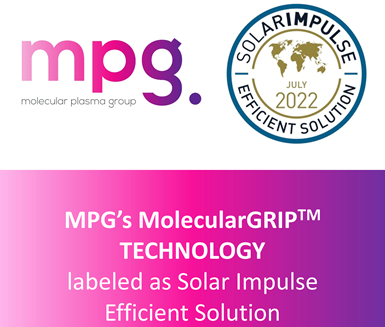Molecular Plasma Group obtains “Solar Impulse Efficient Solution” Label for MolecularGRIP
Solvent-free surface functionalization technology uses low amounts of chemistry and little energy to prime composites and dissimilar materials prior to bonding in addition to other functionalities.

Photo Credit: Molecular Plasma Group
Molecular Plasma Group’s (MPG, Mondercange, Luxembourg) MolecularGRIP technology was attributed the “Solar Impulse Efficient Solution” Label following an assessment performed by external independent experts and based on verified standards. The label serves as an award for clean and profitable solutions.
MolecularGRIP is a solvent-free surface functionalization technology reducing the amount of chemistry required compared to incumbent wet-chemical technologies. It enables the sizing of highly inert, as well as highly sensitive materials, to significantly increase the strength of the bond between fibers — carbon fiber, polyolefin, polyester, natural fibers, etc. — and the polymer matrix. The surface primer is also able to improve adhesive joining of dissimilar materials, according to the company.
MolecularGRIP achieves this through a low-energy cold atmospheric plasma as a tool to graft a nanometric layer of the desired functional chemistry onto the substrate. Typical applications include surface priming of inert materials prior to adhesive bonding, safe virucidal functionality on PPE and air filters using citric acid, bactericidal functionality on textiles, silicon-free and fluor-free release coatings and single-step immobilization of biomolecules such as antibodies and anti-biofouling coatings. MPG says its solution is highly scalable and easily adaptable to many functionalities and production processes. Moreover MolecularGRIP’s environmental impact is said to be very low as it is almost emission-free, and it uses low amounts of chemistry and little energy.
To receive the “Solar Impulse Efficient Solution” Label, MPG’s solution was thoroughly assessed by a pool of independent experts according to five criteria covering the three main topics of Feasibility, Environmental and Profitability. All labeled solutions are part of the #1000solutions portfolio that will be presented to decision-makers in business and government by Bertrand Piccard, chairman of the Solar Impulse Foundation. The aim of this initiative is to encourage the adoption of more ambitious environmental targets and fast-track the implementation of these solutions on a large scale.
Related Content
-
Otto Aviation launches Phantom 3500 business jet with all-composite airframe from Leonardo
Promising 60% less fuel burn and 90% less emissions using SAF, the super-laminar flow design with windowless fuselage will be built using RTM in Florida facility with certification slated for 2030.
-
The potential for thermoplastic composite nacelles
Collins Aerospace draws on global team, decades of experience to demonstrate large, curved AFP and welded structures for the next generation of aircraft.
-
Plant tour: Airbus, Illescas, Spain
Airbus’ Illescas facility, featuring highly automated composites processes for the A350 lower wing cover and one-piece Section 19 fuselage barrels, works toward production ramp-ups and next-generation aircraft.



